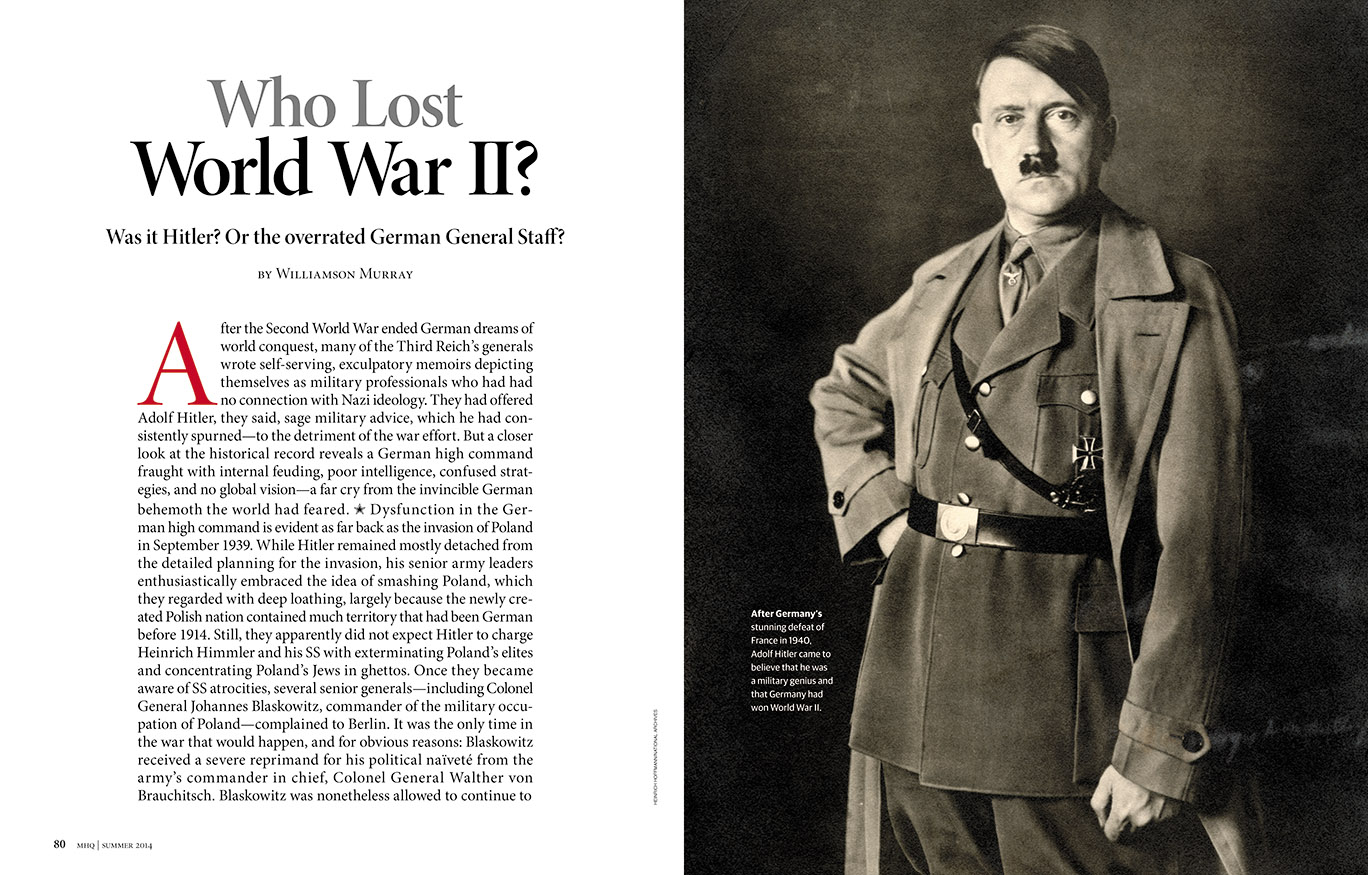
The Summer 2014 issue article “Who Lost World War II?” by Williamson Murray falls a little short. Certainly Adolf Hitler and the German General Staff underestimated the Allies, specifically the United States and Soviet Union, but nowhere in the article is mentioned the Lorenz and Enigma ciphers, Ultra, or the tremendous efforts made at Bletchley Park. A particular comment by Murray, “So much for the strategic competence of [German general Erich von] Manstein, reputedly the Wehrmacht’s greatest strategist,” seems harsh especially when it is common knowledge that the Soviets had Manstein’s battle plan. I would have expected a more thorough analysis from someone with Murray’s credentials.
Sir Harry Hinsley, who worked at Bletchley Park during the war and is a professional historian, has noted, “Information decrypted by Ultra was given to the Soviets, which helped them prepare for the offensive. The Soviets had a spy at Bletchley Park (John Cairncross), who gave them decrypts of German military communications.” Hinsley speculates that without Ultra, Germany would have won at Kursk, and “Hitler could have carved up Russia.”
Paul Shoemaker
Houston, Texas
Williamson Murray responds:
Since I have already made clear in an earlier MHQ article my sense of the importance of Ultra to the winning of World War II [“Ultra: Misunderstood Allied Secret Weapon,” Spring 2002], Mr. Shoemaker’s comments seem rather irrelevant. Nevertheless, let me point out that as the invasion of the Soviet Union in June 1941 and the declaration of war on the United States all received enthusiastic support by the senior German generals, it would seem that they were not exactly connected with basic strategic issues. As for Sir Harry Hinsley’s comment about the importance of Ultra to the Soviet defense of Kursk, this is sheer nonsense. In fact, it is clear that the Soviets had first-rate intelligence in Berlin that informed them of everything they needed to know about the upcoming German offensive at Kursk. All of us historians make mistakes, and in this case Hinsley made a howler. As for Manstein, the brilliant strategist, his purchase of an estate in Pomerania in November 1944 was not exactly the height of strategic wisdom, especially since he knew the extent of German atrocities on the Eastern Front.
Doubt and Redoubt
In your Summer issue Battle Schemes, “A Magazine Map Moves History,” you say that the larger of the two copies of the National Geographic map shown was “marked up to show German defensive lines.” It must have been mislabeled at some point because German lines never followed the patterns shown on the map. The markings on the map are fictional in a second way too: They show Allied forces crossing the Elbe river from east to west. These could only be Soviet forces. But in reality, U.S. forces coming from the west reached the Elbe first, where they met Soviet forces.
There is another explanation of the markings on the map that fits them better. There was much talk in Allied circles in the final months of the war that the Germans would withdraw into a “national redoubt” in the Alps. The markings on the map seem to show someone’s speculative scenario of a staged German withdrawal into such a redoubt. But, of course, that never actually happened.
Rick Kirkham
Seattle, Washington
The Editors respond:
The marked-up map shown in the Summer Battle Schemes was labeled an “Overprint of Defensive Lines to Accompany Study of German National Redoubt,” but as you say, the lines were clearly speculative rather than a reflection of the true situation on the ground.
More Japanese POWs in WWII
Your Summer Ask MHQ, about Japanese POWs, reminded me of things my father, William J. Winter, a U.S. Army parasitologist in the South Pacific theater, told me. Years ago I attempted to gather stories about his wartime service, but he passed away before we got very far.
He mentioned that some 400 to 500 Japanese POWs were kept near Kilauea. There was a concern they might infect the local population with mosquito-borne parasites picked up elsewhere, so immediately after the war, my father was shipped from New Caledonia to Oahu to test blood samples from the POWs. He was a different kind of underappreciated hero.
Bob Winter
Boulder Colorado
We welcome your comments. Visit MHQmag.com or e-mail MHQeditor@weiderhistorygroup.com. Letters are edited for length and clarity.

.jpg)



